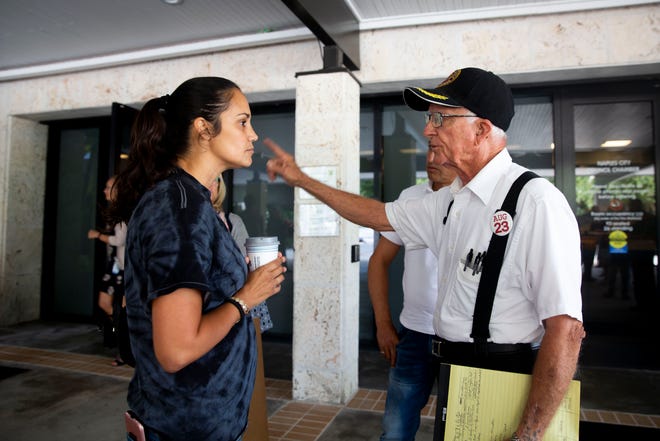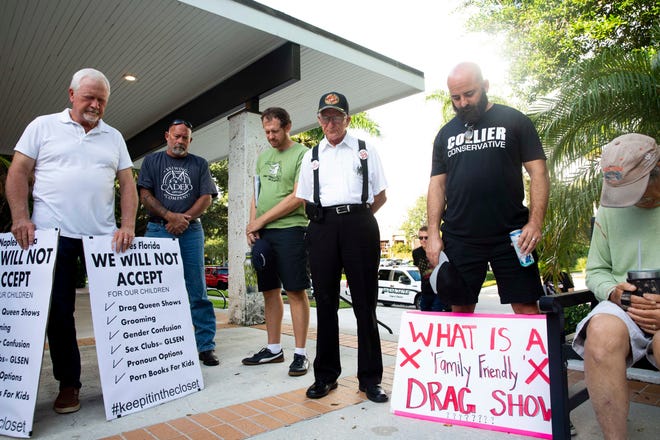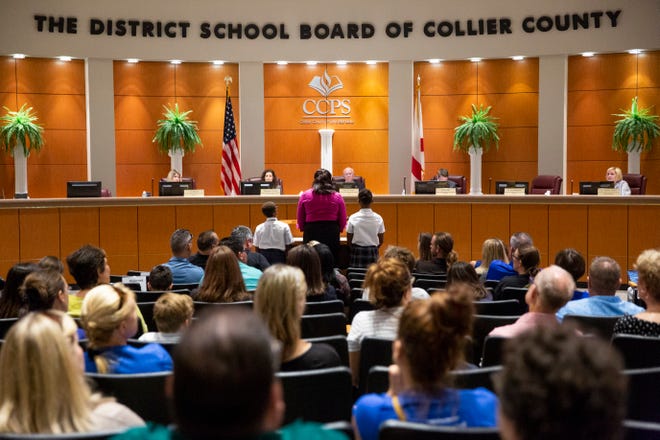The morning after being elected, a new school board member in South Florida said he wants to bring back corporal punishment in classrooms and would like to see fewer rights for LGBTQ students.
Collier County school board’s newly elected member Jerry Rutherford announced the goals Wednesday after beating longtime teacher, administrator and school board member Jory Westberry for the District 1 seat in Tuesday’s election.
Rutherford, who protested the LGBTQ festival in Naples and has pushed for Bibles in schools,
won the seat with a strong 65.4% of the vote to Westberry’s 34.6%.
GOP school boards?:How Republicans fared in school board elections all over the country
MORE:These PACS are funding ‘parents’ rights advocates’ running for local school board positions
After speaking on myriad issues at school board meetings countless times for more than 35 years, Rutherford told the Naples Daily News in July he decided he didn’t want to be on the outside looking in anymore, so he joined the school board race.
This was his first time running for any elected position, he said.
Rutherford was endorsed by the Collier County Republican Executive Committee, which endorsed all three challengers to the school board. All of them won their races.
He’s fought to distribute Bibles in schools and to institute prayer at school board meetings. He has also protested Naples’s LGBTQ Pride festival, specifically speaking out against drag shows.
A veteran of the Air Force, Rutherford has worked in sales and construction and owned a painting business in the Naples area for more than 20 years. He also served as a substitute teacher in the district for three years.
More:Big money is targeting school board races this election. Our reporters investigate why.
Rutherford’s dramatic shift in priorities after being elected
Rutherford’s stated positions changed dramatically before and after his election.
In July, he told the Naples Daily News, part of the USA TODAY Network, his priorities were to ensure proper education that helps everyone succeed, improve safety and mental health for students and teachers, and address budgetary concerns.
But Wednesday morning, reached by phone, Rutherford said he has a five-point agenda he’d like to implement, including “mental and physical discipline,” or physical punishment of children in Collier’s public schools.
“I only went to the principal’s office one time when I was in school and that was when they used the ‘board of education,’ if you get what I’m saying,” Rutherford said.
Election 2022 Q&A:Collier School Board candidates talk CRT, parents rights law and more
‘A step backward’:Parents, teachers protest ‘Don’t Say Gay’ bill in downtown Naples
‘Warning sign for all people’: Collier School Board candidate faces backlash over campaign’s antisemitic worker
Rutherford added that disabled students are not in control and get away with too much.
According to a 2021 analysis by the Education Commission of the States, which tracks education policies, Florida is one of at least 18 states that allows corporal punishment in public schools as long as the district allows it. According to the National Association of State Boards of Education, Florida does not require parental permission, only written parental notification after the fact.
Currently, Collier County prohibits corporal punishment. According to school board policy 5630, “the use of corporal punishment, defined in Florida statute as the use of physical force or physical contact for disciplinary purposes, is prohibited.”
Florida Statute 1003.573 states that disabled students can only be physically restrained if there is an imminent risk of serious injury or death to the student or others and only once all positive behavioral strategies have been exhausted.
Jackie Stephens, CEO of the Children’s Advocacy Center in Collier County, said she was “alarmed” to hear a school board member wants to bring back corporal punishment to the classroom.
“It can be detrimental to the children,” Stephens said. “There are no studies that really indicate that spanking is beneficial. It can actually lead to worse behavior and aggression.”
Stephens said many countries have outlawed the spanking of children, even by their own parents. In the United States, many organizations have registered as a “No Hit Zone,” which means they do not condone hitting of any kind.
“There’s a lot of places that are becoming no-hit zones, like the Children’s Advocacy Center and hospitals. I think at school would be a good place not to hit children.”
LGBTQ groups raise alarm over new Collier County school board member
Rutherford’s agenda also focuses on “respect,” he said. “There needs to be respect for ourselves, for others, and for authority.”
In that vein, he said people are being indoctrinated into supporting LGBTQ rights, and “when it comes to indoctrination, I will not put up with that,” he said.
Rutherford added that some legislators had passed bills he believes extends the rights of LGBTQ people beyond normal rights.
“I’m all for equal rights, but I’m not for special rights,” he said.
More:Number of LGBTQ school board candidates has grown in 2022 amid controversial bills, report shows
More:Abortion bans and LGBTQ-targeted laws are catching some school campuses in the crosshairs
For example, he said, an LGBTQ student group in Collier County gave teachers a sticker to put on their doors with a rainbow that says “safe zone.” One teacher, he said, refused to put it up.
He did not elaborate further on what rights LGBTQ people have that others do not.
According to The Safe Zone Project, which gives trainings that allow people to learn about LGBTQ identities as well as examine prejudices and biases, the words “safe zone” typically communicate that the person is an ally of the LGBTQ community, has gone through a Safe Zone training, or is trying to communicate support.
“I don’t have a problem with that, but it should extend to sectarians,” Rutherford said.
“If you’re going to have a secular symbol, you have to give a religious one,” he said. “What if we gave teachers a sticker with a cross that said ‘saved zone?’ We have religious rights, and we have personal rights.”
GLSEN, a nonprofit dedicated to promoting LGBTQ students through policy writing and advocacy, said elected leaders and elected school leaders have a responsibility to protect all young people, including LGBTQ youth.
“Queer students in Florida, especially those of color and those who are trans and nonbinary, are being cruelly targeted by extremists,” said GLSEN executive director Melanie Willingham-Jaggers. “They are facing a hostile climate amid curriculum censorship laws and have been repeatedly subject to political attacks. Florida’s students deserve so much better from the adult politicians who are supposed to support them. This kind of anti-LGBTQ+ fear-mongering and misinformation from any school leader is unacceptable.”
“We are absolutely saddened by his agenda,” said Naples Pride president Cori Craciun. “LGBT kids’ rights have been taken away by the Parental Rights Bill, and the Florida Medical Board, which banned (gender-affirming) care for transgender minors. … The ‘safe zones’ are there to protect these children. They are often the only place these children know there is a supportive adult they can reach out to.”
Wanting to increase religion in public schools
Federal law on Bibles in public schools is derived from the 1963 Supreme Court case Abingdon v. Schempp, which draws a distinction between devotional reading and the objective study of religion.
In short, while religious texts like the Bible are allowed in public schools for the purpose of studying, what is not allowed is devotion or reading from the Bible as religious practice.
Rutherford said he wants to see “textbooks that are free from bias, censorship and rewritten history,” as well as “morals and ethics in school.”
He said he planned to review all new textbooks and would flag anything he saw as dubious or biased. He did not specify what he considered to qualify as biased or rewritten history.
Rutherford was also eager to see a civics class reinstated in the curriculum, where students would study the Constitution and the Bill of Rights, per Gov. Ron DeSantis’ recent policy.
But Rutherford said he felt the government has gone too far in other ways, such as by forcing students and teachers to wear a mask in 2020 to prevent the spread of COVID-19 and by requiring military personnel to get vaccinated against the virus that has killed more than 1 million people across the United States.
As a former airman, he expressed frustration by that.
“They’re saying no (to the vaccine), and they’re getting thrown out for that,” he said.
He noted that while Collier Public Schools required masking early in the pandemic, Mason Classical Academy, a local charter school, did not, which he said better exemplified respect for students’ rights. Collier should follow Mason’s example, he said.
Education reporter Nikki Ross contributed to this article. Kate Cimini is an investigative journalist covering Florida. kcimini@gannett.com.







